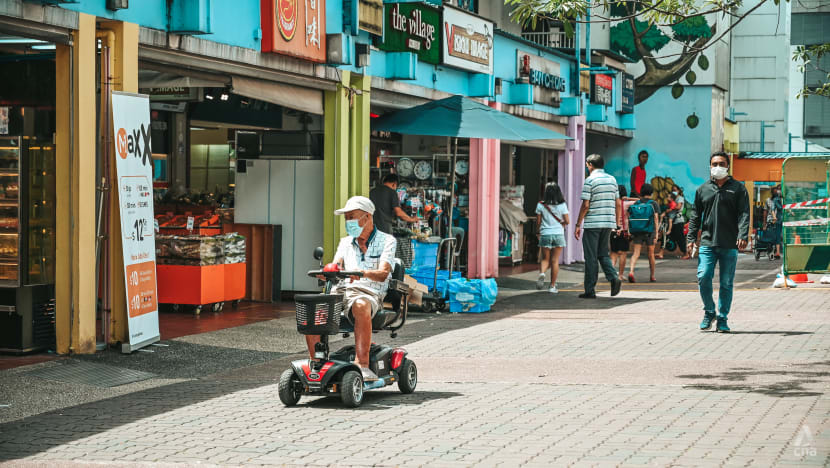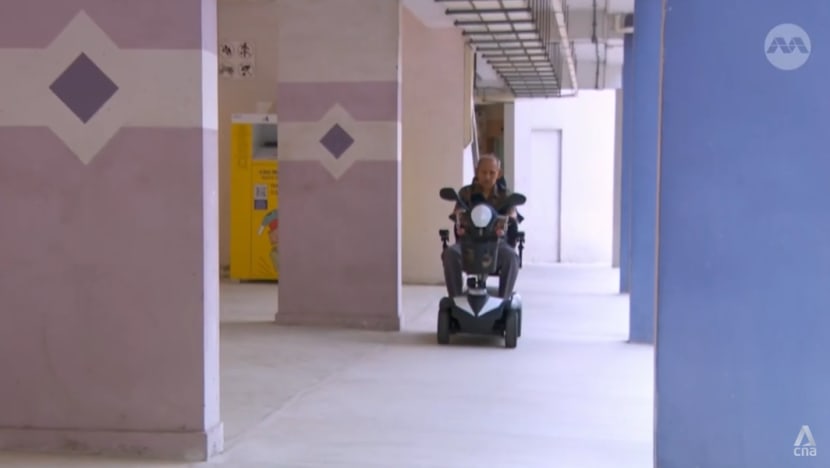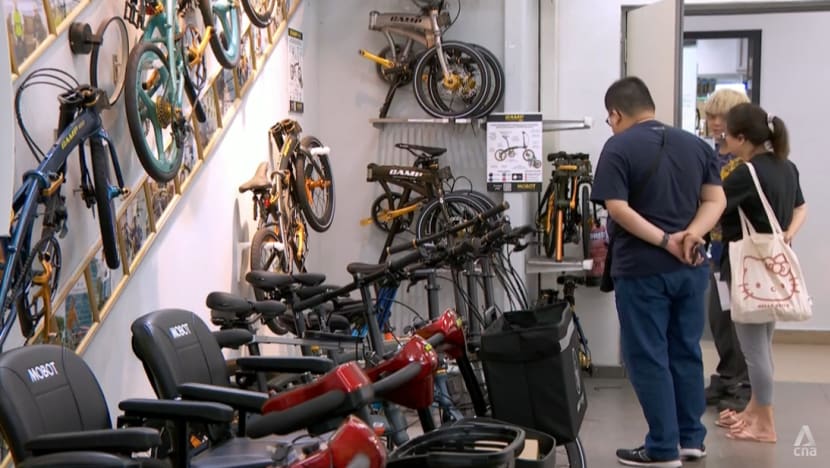PMAs should be reserved for those with certified medical needs or walking difficulties: Sellers, therapists

An elderly man on a personal mobility aid (PMA). (Photo: Hanidah Amin)

This audio is generated by an AI tool.
SINGAPORE: Retiree Yahyah Amudin's walking difficulties used to mean a caregiver had to accompany him whenever the 82-year-old left home.
That is, until three years ago when he received help from SG Enable’s Assistive Technology Fund to buy a mobility scooter after recommendations from doctors.
“My legs – I cannot walk. Doctors sent me to social workers, who interviewed me. They then sent me to a shop (selling personal mobility aids),” he told CNA. “I was taught to drive a mobility scooter. They watched as I drove, then I passed (their assessment), then they allowed me to have a scooter.”
He uses the device for all daily commutes, such as visiting the wet market to buy groceries and the polyclinic for checkups.

“If I don't have this scooter, I can only stay home and cannot go out. On this scooter, I can go everywhere. This scooter is important to me. I can go to the mosque and pray,” said Mr Amudin.
Although he keeps to a leisurely pace, he has encountered seemingly able-bodied users speeding along pedestrian walkways, which could be “very dangerous”, he said.
This is set to change when regulations kick in around next year, and only those who are certified to have relevant medical needs will be allowed to use such devices.
Subsidies under the new regulations will recognise users like Mr Amudin as someone who genuinely needs personal mobility aids (PMAs).
NEW REGULATIONS FOR PMAs
Earlier this month, the Ministry of Transport (MOT) said it had reviewed and accepted recommendations by the Active Mobility Advisory Panel (AMAP) on PMA regulations.
The recommendations came after focus groups raised concerns over the misuse of PMAs by those who appear able-bodied, such as speeding or the use of overly large devices.
The panel said the lack of regulations on the purchase and safe use of the devices compromises the safety of other path users, especially seniors and young children.
MOT said on Mar 5 that the recommendations will be implemented around 2025, following necessary legislative amendments.
The maximum speed of motorised PMAs – which include mobility scooters and motorised wheelchairs – is also set to be capped at 6kmh from the current 10kmh, to better reflect the typical brisk walking speed of path users.
The ministry said sufficient time will be provided for users and retailers to adjust to the new rules.
Occupational therapists and sellers of PMAs have welcomed the move, saying such mobility tools should be reserved for those who have certified medical needs or walking difficulties.
REACTION TO REGULATIONS
MOBOT, one seller of mobility products, said it supports such regulations to keep paths orderly. The firm has been doing its part by trying to match users to the right devices.
“As a responsible retailer, we assess the customer before we sell the devices. We recommend something that is suited to their needs,” said the company’s brand manager Bobby Lai. “PMAs are for users with difficulty walking. (Otherwise), we recommend other products such as bicycles, electric bicycles, or electric scooters.”
Mr Lai said he believes such enforcement action benefits pedestrians and businesses, but will require more paperwork from genuine users.
“It will be more troublesome for those genuine users because there will be an additional step – they have to go and get that extra certificate,” he said.
“But, more regulation means that the market can last for a longer time. If there is no regulation, there will be chaos on the roads. Overall, it's a good thing. We hope there will be more action done for illegal PMAs.”

OVER-RELIANCE ON PMAs CAN HARM HEALTH
Occupational therapists said individuals who do not medically need PMAs as a transport tool should consider other options that are more suitable, such as walking or riding a bicycle.
Relying too much on mobility aids can weaken muscles all over the body, especially in the legs, said Ms Teo Xin Yun, a senior occupational therapist at physiotherapy centre Prorehab. She added that having less physical activity is harmful to overall health.
“Patients who have not been certified by the doctors to have a medical condition that warrants a motorised device, perhaps they could try some strengthening exercises to improve their exercise tolerance so that they will be able to work for a longer duration,” she said.
She added that the new guidelines will help to identify patients who truly require such products, which will reduce reckless riding and potential physical harm that may be caused to users themselves or to the public.
The government has also said it wants to encourage seniors to keep walking, in order to stay active and healthy as they age.

















